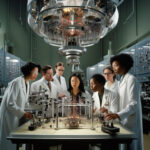The concept of automated kitchens has shifted from the realm of science fiction to everyday reality. With advancements in artificial intelligence (AI), robots are now preparing a diverse range of dishes, from gourmet burgers to intricate sushi rolls. This evolution in kitchen technology holds the potential to transform how we cook and consume food, reminiscent of the microwave oven’s impact decades ago, which introduced unparalleled convenience and reshaped dining experiences.
AI-driven kitchens come equipped with various sophisticated features. Smart appliances can monitor cooking progress, adjust temperatures, and even suggest recipes based on available ingredients. For instance, companies like Suvie and Smart Kitchen have developed appliances that can cook meals autonomously, preparing everything from roasting to steaming. Such innovations aim to simplify meal preparation, providing users with more time to focus on what truly matters—enjoying food with family and friends.
Despite these advantages, the integration of AI in kitchens is a double-edged sword. It raises significant concerns about the loss of traditional cooking skills, a desire often fueled by nostalgia. Cooking has long been a way to connect with family and culture, offering a therapeutic outlet for many. The fear is that, as machines take over kitchen duties, this deeply ingrained ritual may diminish, along with the opportunities for families to bond over cooking and share culinary traditions.
Moreover, the use of AI can lead to a homogenization of culinary experiences. As AI systems often rely on data-driven approaches to optimize recipes, they may oversimplify complex cultural practices in cooking. For example, a system trained on a limited dataset might produce standardized versions of regional dishes, neglecting the unique variations that contribute to cultural richness. This could ultimately undermine the diversity of cuisines that define different communities, leading to a more uniform global culinary landscape.
Another pressing issue is food safety and ethical considerations in the kitchen. As AI continues to advance, questions arise about how food safety standards can be maintained. For instance, automated systems must ensure that cooking temperatures are regulated adequately to prevent foodborne illnesses. The reliance on technology raises concerns about accountability when things go wrong. If a robotic chef prepares a meal that causes food poisoning, who is responsible—the machine, the manufacturer, or the user?
Additionally, there is the undeniable economic impact. The rise of automated kitchens threatens traditional jobs in the culinary sector. While AI can enhance efficiency and cut labor costs for restaurants, it could displace skilled workers. As automation becomes standard in commercial kitchens, the jobs of chefs and kitchen staff are at risk, which could impact local communities both economically and socially.
Despite these challenges, the potential benefits of AI in the kitchen are substantial. For chefs, AI can serve as a creative partner, providing inspiration and suggestions that enhance culinary innovation. The automation of mundane tasks allows chefs to focus on refining their craft and experimenting with new flavors. This represents a shift towards collaboration between humans and machines, fostering a new era of culinary exploration.
Moreover, personalized meal preparation enabled through AI can lead to healthier eating habits. Smart kitchen devices can track nutritional information and offer tailored suggestions, empowering users to make informed dietary choices. These systems can cater to individual preferences, dietary restrictions, and even provide meal plans based on health goals, like weight loss or muscle gain.
As AI kitchens become increasingly prevalent, society must address the intricate balance between embracing innovation and preserving culinary heritage. The integration of AI should not come at the cost of diminished traditions, skills, and diversity in food preparation. To achieve this balance, stakeholders—including technology developers, chefs, and policymakers—must collaborate to create a framework that promotes the responsible use of AI in kitchens.
This engagement can help ensure the benefits of automation enhance rather than diminish our culinary experiences. Conversations about the implications of AI must remain at the forefront of this revolution, paving the way for a future where technology complements human creativity rather than replacing it.
In conclusion, the advent of AI in kitchens worldwide sparks a broader discussion about health, community, and the preservation of culinary arts. The challenge lies in harnessing the benefits of innovation while safeguarding the rich tapestry of food culture that binds society together.












